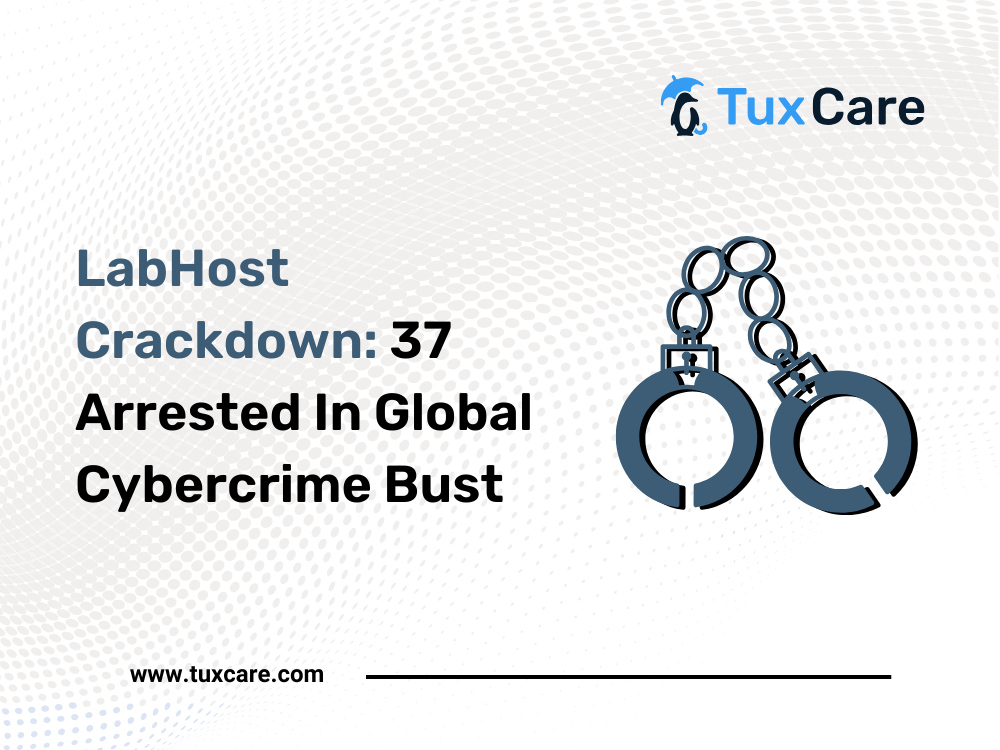LabHost Crackdown: 37 Arrested In Global Cybercrime Bust
In a significant stride against cybercrime, law enforcement agencies worldwide have orchestrated a comprehensive crackdown on LabHost, a notorious cybercrime service facilitating multi-national phishing operations. This operation, named PhishOFF and Nebulae, has led to the arrest of 37 individuals involved in the nefarious activities of LabHost. Let’s look into the details of this international LabHost crackdown, as well as some phishing prevention tips to help you stay safe online.
LabHost Crackdown
LabHost, identified as one of the largest Phishing-as-a-Service (PhaaS) providers, operated by offering sophisticated phishing pages targeting a wide array of institutions, including banks, high-profile organizations, and service providers.
The platform primarily targeted victims in Canada, the U.S., and the U.K., employing persistent phishing attacks through texts and emails to steal sensitive personal information such as online banking credentials, credit card details, and passwords.
International Cooperation and LabHost User Arrests
The coordinated effort, led by Europol, resulted in the apprehension of 37 individuals across multiple countries, including Australia and the U.K. In Australia, two LabHost users were arrested in Melbourne and Adelaide, while in the U.K., four individuals allegedly responsible for developing and operating the service were detained. This joint international LabHost crackdown involved the participation of agencies from 19 countries, demonstrating the global collaboration required to combat cyber threats effectively.
Scope of Criminal Activities
LabHost’s nefarious activities extended beyond traditional phishing operations. The platform boasted a catalog of over 170 fake websites, offering convincing phishing pages tailored to mimic various brands and organizations globally.
Recent reports claim that these phishing templates targeted popular brands such as Spotify, postal services, car toll services, and insurance providers, amplifying the scope of potential victims. The authorities focused on dismantling phishing infrastructure to disrupt cybercriminal operations effectively.
Modus Operandi and Implications
LabHost malware provided a comprehensive suite of services to its customers, simplifying the process of orchestrating phishing attacks. With features like LabRat, cybercriminals could monitor and control their attacks in real time, bypassing security measures such as two-factor authentication.
The platform’s infrastructure, encompassing more than 40,000 domains, facilitated the theft of sensitive information, including names, addresses, emails, card numbers, passwords, and PINs. The financial implications of LabHost’s operations were staggering, with estimated revenues exceeding £1 million ($1,173,000) and the acquisition of over 480,000 card numbers, 64,000 PINs, and one million passwords.
Analysis of LabHost’s crypto wallets revealed transactions totaling over $1.1 million, indicating extensive money laundering activities to obfuscate the illicit origins of funds. Additionally, connections with other illegal services, such as iSpoof, underscored the interconnected nature of cybercrime networks.
LabHost Phishing-as-a-Service (PhaaS): Lowering Barriers to Cybercrime
The takedown of LabHost highlights the growing prominence of PhaaS platforms in the cybercrime landscape. These platforms democratize cybercrime by providing aspiring threat actors with easy access to sophisticated tools and services, enabling them to execute phishing attacks on businesses without significant technical expertise. The proliferation of PhaaS platforms underscores the urgent need for concerted global efforts to combat cyber threats effectively.
Protecting Against Phishing Scams
The LabHost crackdown serves as a stark reminder of the borderless and adaptive nature of cybercrime. Organized criminal networks are increasingly agile and destructive, necessitating a concerted, sustained, and multilateral response from the global law enforcement community. Collaboration and cooperation among nations are paramount in addressing the evolving challenges posed by cyber threats and safeguarding the integrity of digital ecosystems.
Conclusion
The LabHost crackdown represents a significant milestone in the ongoing battle against cybercrime disruption. Through international cooperation and coordinated efforts, law enforcement agencies have dealt a severe blow to a prominent PhaaS provider, disrupting its operations and mitigating the threat posed to individuals and organizations worldwide.
However, the fight against cybercrime is ongoing, requiring continued vigilance, collaboration, enhanced cybersecurity measures, and innovation to stay one step ahead of cybercriminals.
The sources for this piece include articles in The Hacker News and Security Affairs.



 Documentation
Documentation Login
Login




